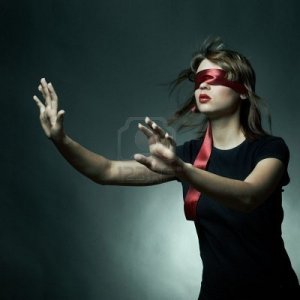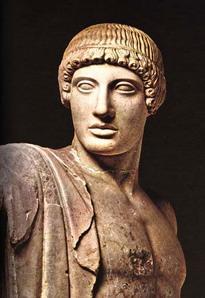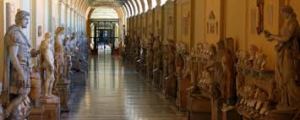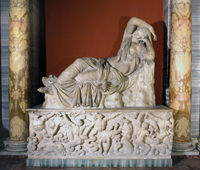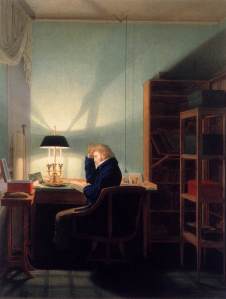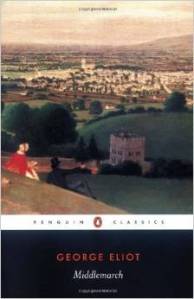Mr. Lydgate, the new medical doctor in Middlemarch, has been educated at London, Edinburgh, and Paris, where he has been exposed to the leading research and theory in medical science (131). He has deliberately sought a liberal education in his desire to be a fine practitioner. Mr. Brooke, knowing some of Lydgate’s background, states “that he is likely to be first-rate—has studied at Paris, knew Broussais; has ideas, you know—wants to raise the profession” (82). Indeed, Lydgate imagines his future when he will have “trodden out a good clear path for himself, away from the broad road which was quite ready made” (84).
He is loath to continue a medical practice which has become status quo; he presses for new theory and new research which will lead to a more effective medical practice. As such, he dedicates himself to research. The post he accepted at the hospital facilitates his passion for research, gives him “free authority to pursue all comparative investigations which his studies, particularly in Paris, had shown him the importance of” (412). We glimpse his methods of research: “His more pressing business was to look into Louis’ new book on Fever, which he was specially interested in, because he had known Louis in Paris, and had followed many anatomical demonstrations in order to ascertain the specific differences of typhus and typhoid” (149). He, then, reads until very late in the night, “bringing a . . . testing vision of details and relations into this pathological study” (149). Lydgate’s conception of scholarship is in line with that conceived by Newman.

It is worthwhile noting how Lydgate’s education and scholarship differ from Casaubon’s. Lydgate, like Casaubon, wants to achieve a great work and, like Casaubon, he envisions a totalizing work. We have already established the focus of Casaubon’s work: to unlock the key to all mythologies. Now, we examine the subject of Lydgate’s work. He views “the dark territories of Pathology” to be “a fine America for a spirited young adventurer” (133). Specifically, the scope of his project is “to demonstrate the more intimate relations of living structure, and help to define men’s thought more accurately after the true order. The work had not yet been done, but only prepared for those who knew how to use the preparation. What was the primitive tissue?” (135). Lydgate embraces progression; he views himself as a discoverer (134). He follows the methods of scientific research; he advocates for empirical study. As a result, Lydgate has a great affinity for the microscope: “The use of the lens [would] further his judgment in special cases, would further his thought as an instrument of larger inquiry” (133). Lydgate, consequently, anticipates progression, unlike Casaubon who “[wanders] about the world and [tries] mentally to construct it as it used to be, in spite of ruin and confusing changes” (13). Lydgate wants to construct; Casaubon wants to reinstate.
Lydgate’s ethical attitude regarding his responsibility to scholarship and to society is another divergence from Casaubon’s attitude. Lydgate views himself as a member of a community of scholars, and he views his research to be, not an end project, but a piece of a wider scholarship: “Lydgate was ambitious above all to contribute towards enlarging the scientific, rational basis of his profession” (134). Because he deems the advancement of knowledge to be a collegial task, he values research conducted by those preceding him. The narrator relates: “The more [Lydgate] became interested in special questions of disease . . . the more keenly he felt the need for that fundamental knowledge of structure which just at the beginning of the century had been illuminated by the brief and glorious career of Bichat, who died . . . but . . . left a realm large enough for many heirs” (134). Therefore, we learn that Lydgate looks to those who came before him, but also to those who will come after him. We remember that Casaubon isolates himself from other scholars and that he rejects new theory being published in his day. He is not building on, nor advancing, knowledge; he is pulling all mythologies under one reigning mythology (or at least attempting this project). Lydgate views his own scholarship as one link in a chain of discoveries which are beginning to emerge: “He was ambitious of a wider effect: he was fired with the possibility that he might work out the proof of an anatomical conception and make a link in the chain of discovery” (132). Lydgate views research to be reciprocal: scientists build on one another’s ideas with the shared goal of advancing knowledge. It is obvious that Lydgate has a more progressive approach to scholarship than does Casaubon.
We need to examine the nature and effect of Lydgate’s education under Newman’s model of a liberal education. Newman’s conception of learning includes an interaction with new theories. He explains:
There is no enlargement, unless there be a comparison of ideas one with another, as they come before the mind, and a systematizing of them. We feel our minds to be growing and expanding then, when we not only learn, but refer what we learn to what we know already. It is not the mere addition to our knowledge that is the illumination; but the locomotion, the movement onwards, of that mental centre, to which both what we know, and what we are learning, the accumulating mass of our acquirements, gravitates (135).
Newman’s description of the enlarged mind resonates with Lydgate’s approach to learning, for he intersects what he is learning with what he has already learned. That is to say that he makes room for new knowledge, but does not neglect what has already been established. He becomes fully enthralled in his study of Fever, which “gave him that delightful labor of the imagination which is not mere arbitrariness, but the exercise of disciplined power – combining and constructing with the clearest eye for probabilities and the fullest obedience to knowledge; and then, in yet more energetic alliance with impartial Nature, standing aloof to invent tests by which to try its own work” (149). He is engaging in that vibrant work of enlarging the mind as Newman describes it.

Lydgate’s idealism about the good he will do reminds us of Dorothea’s own quixotic notions about her philanthropic acts. It was a deficient education that augmented Dorothea’s idealism and led her into her tragic marriage to Casaubon. We now examine the deficiencies that lead to Lydgate’s tragedy. We learn that Lydgate is “still in the making” and that “there were both virtues and faults capable of shrinking or expanding” (135). The narrator discloses that “[he] is a little spotted with commonness” and that “[his] conceit was of the arrogant sort . . . massive in its claims and benevolently contemptuous” (135-6). Lydgate is confident that his vulnerability is protected by his intelligence and by his experience which taught him to constrain his passion. He feels quite impervious to enticement. However, we know of “the fitful swerving of passion to which he was prone, together with the chivalrous kindness which helped to make him morally lovable” (137). His compassion and sincerity are much like that of Dorothea, and much like Dorothea, if they are not tempered, will lead to tragedy. While Dorothea has Ladislaw who shines light onto her ignorance, Lydgate has not opened himself up for anyone to shed light onto his errors. Mr. Farebrother may have been a candidate for such a position, but his vices and contradictions undermine him; furthermore, Lydgate has not always been forthcoming in speaking to Farebrother about personal matters (671). As a result, Lydgate falls into the vices of Rosamond Vincy whose education has elevated her to a status far above the life she experiences with Lydgate. This fateful union leads to Lydgate’s debt and ultimately to a scandal in which he becomes embroiled.Lydgate is certainly passionate about his scholarly work, but not at the expense of philanthropy. In fact, Lydgate considers “the most perfect interchange between science and art; offering the most direct alliance between social conquest and the social good” (131). Again he notes that his “pursuit of a great idea was to be a twin object with the assiduous practice of his procession” (133). Lydgate imagines that he will make a significant medical breakthrough which will grant him recognition in the scientific community; yet, ultimately, he is motivated by contributing to medical science for the benefit of the patient. He explains: “He meant to be a unit who would make a certain amount of difference towards that spreading change which would one day tell appreciably upon the averages, and in the meantime have pleasure of making an advantageous difference to the viscera of his own patients” (132). His research is not merely theoretical for it leads him to provide his patients with better treatment options.
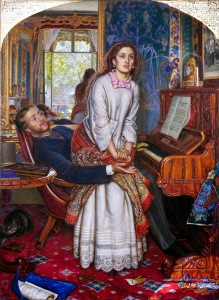
Dorothea views the Lydgate scandal as a travesty in which she can exercise her power of influence to bring restoration. Dorothea, the Saint Theresa, who has desired an epic life, has finally the resources of knowledge to be an agent of benevolence. It is in her dealing with Lydgate that we appreciate how much her education has empowered her. She relates that “some of her intensest experience in the last two years had set her mind strongly in opposition to any unfavourable construction of others” (670). Upon considering their responsibility to Lydgate, she contends: “What do we live for, if it is not to make life less difficult for each other? I cannot be indifferent to the troubles of a man who advised me in my trouble, and attended me in my illness” (671). The narrator makes an important observation regarding Dorothea’s speech: “[Her] tone and manner were not more energetic than they had been when she was at the head of her uncle’s table nearly three years before, and her experience since had given her more right to express a decided opinion” (671). Dorothea’s experiences and education merit her passionate assertions regarding social responsibility; that is to say that Dorothea is not merely idealistic. Her education has enlarged her vision so that she considers the implications of intervening on this public matter; yet she maintains that it is her responsibility, regardless. Her longing to do good has a subject: “The ideas of some active good within her reach, ‘haunted her like a passion,’ and another’s need having once come to her as a distinct image, preoccupied her desire with the yearning to give relief” (696). What is also notable is that she ignores “the heeding that she was a very young woman,” meaning that it is not her place to defend or benefit a man caught in a scandal. Having gained subjectivity, she declares: “Nothing could have seemed more irrelevant to Dorothea than insistence on her youth and sex when she was moved to show her human fellowship” (696). This is a significant change from the powerless young woman who attached herself to Casaubon as a means to promote social change and to do good. Now, Dorothea dismisses any such notion that she defer to an older man and she acts on the knowledge and wealth she possesses.

It is due to Dorothea’s confidence and generosity that Lydgate is restored to the hospital and to the town’s medical community. He notes his transformation on account of Dorothea: “The presence of a noble nature, generous in its wishes, ardent in its charity, changes the lights for us: we begin to see things again in their larger, quieter masses, and to believe that we too can be seen and judged in the wholeness of our character” (697). He gives himself up, as he says, “to the exquisite sense of leaning entirely on a generous sympathy, without any check of proud reserve” (698). His loss of self-confidence begins to be restored on account of Dorothea’s benevolence. Dorothea, on her part, exercises the kind of charity she has longed for, using her money to “make other people’s lives better to them” (700). In this way, she explains that she will achieve a two-fold purpose in her endowment: “The Hospital would be one good; and making your life quite whole and well again would be another” (700). Her contributions to society are less grand than she would have desired for herself; nevertheless, it is clear that she makes a profound impact on many. The Finale tells us that “her full nature, like that river of which Cyrus broke the strength, spent itself in channels which had no great name on the earth. But the effect of her being on those around her was incalculably diffusive: for the growing good is partly dependent on unhistoric acts” (766). Dorothea becomes a viable force in her society for social change.
Eliot bookends the novel with the prelude and the finale, which, among other things, articulate the role of Dorothea as a Saint Theresa in her society. The prelude introduces us to the Theresas “who found for themselves no epic life wherein there was a constant unfolding of far-resonant action’ perhaps only a life of mistakes, the offspring of a certain spiritual grandeur ill-matched with the meanness of opportunity” (1). In addition, the prelude discloses the failure of society to educate such women, providing them with “no coherent social faith and order which could perform the function of knowledge for the ardently willing soul” (1). We have established how Dorothea’s flawed education denied her the intellectual resources to do good and we how her relationships with others, especially with Ladislaw, enlarged her vision and intellect so that she could begin to act as an agent of social welfare. Indeed, the finale tells us that “the determining acts of her life were not ideally beautiful. They were the mixed result of a young and noble impulse struggling amidst the conditions of an imperfect social state” (765). In spite of the hindrances to her growth, Dorothea is helped along the way by her own intellectual pursuits and by those educated men who affirm and challenge her intellect. In the end, Dorothea has a life filled with “beneficent activity which she had not the doubtful pains of discovering and marking out for herself” (763). We also note that she gives Will Ladislaw, newly elected Member of Parliament, her “wifely help” (764). Dorothea’s liberal education furnishes her with the necessary resources to fulfill the life of good will that she so desires. We conclude with the words of Newman: “When the intellect has once been properly trained and formed to have a connected view or grasp of things, it will display its powers with more or less effect according to its particular quality and capacity in the individual” (xviii).
Eliot, George. Middlemarch. 1872. Toronto: Bantam, 1992. Print.
Newman, Cardinal John Henry. The Idea of a University. New York: Longmans Green. 1907. http://www.newmanreader.org. Web. 27 November 2010.

